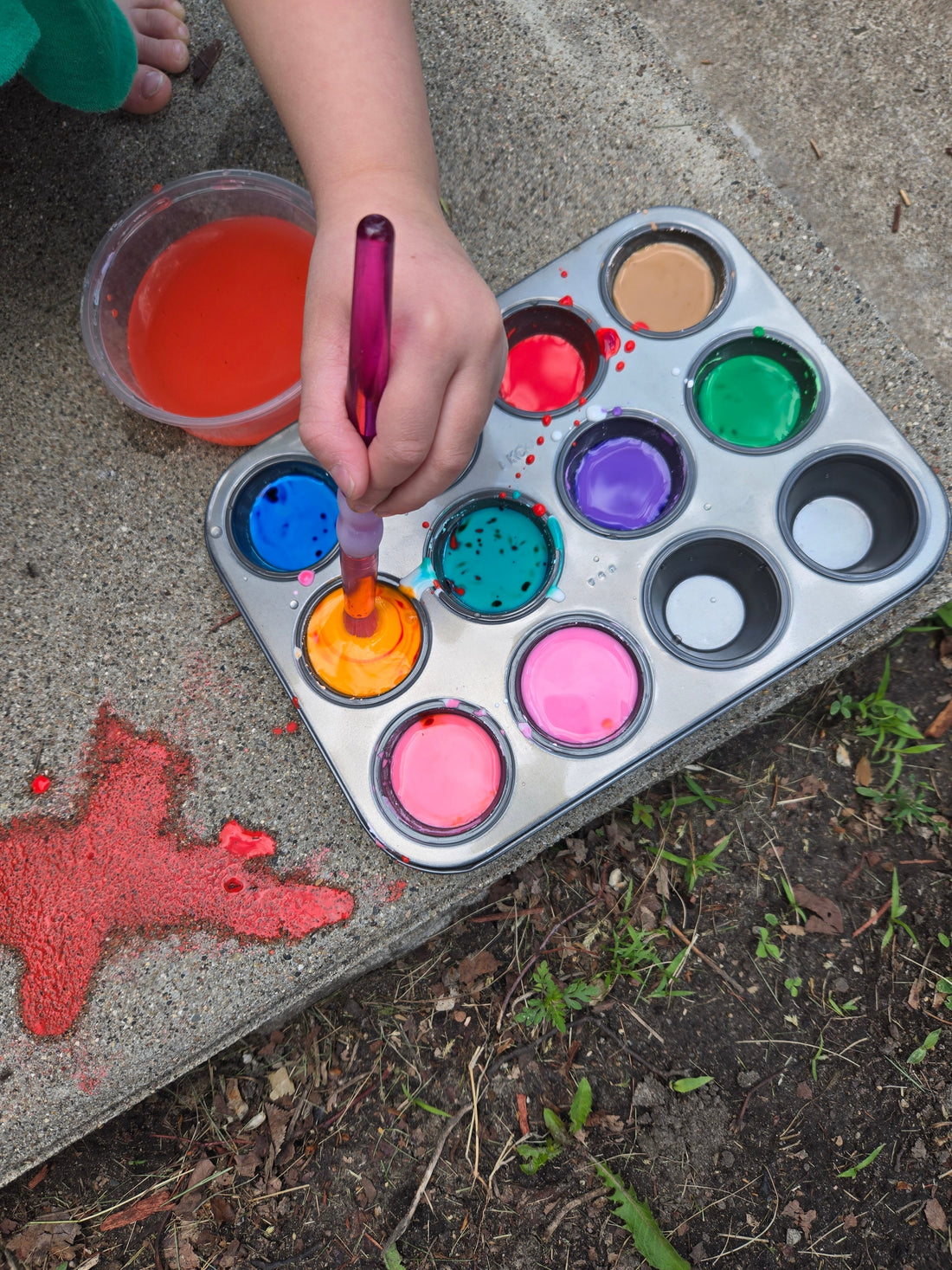
DIY Chalk Paint: Your 3-Ingredient Recipe for Success
Share
DIY Chalk Paint – A Summer Favorite!
We’ve done chalk paint several times and I’m officially hooked. It’s quick to set up, wildly fun, and packed with messy, open-ended, creative play! Chalk is great, but chalk paint takes it to another level. 🎨✨
We had a blast, and I can already tell this is going to be in our regular summer rotation for years to come. I think it's safe to say this is an incredible all ages activity (details on why below)
This has been on my “we should totally try that” list for a couple of summers now... and I FINALLY did it. Don’t be like me—add the ingredients to your grocery list. Right. Now.
🩼 Ingredients & Supplies:
- Corn starch
- Food coloring (I used gel)
- Water
- Paint brushes or sponge dabbers
- Cups, bowls, or a muffin tin (ours was secondhand!)
- Popsicle sticks (optional, but perfect for mixing)
🖌 How to Make It:
- Mix corn starch and water in a bowl using a 1:1 ratio (any amount works!)
- Divide into containers before adding food coloring
- Add one drop of color per container, stir with a popsicle stick, and paint away!
🌈 My Sample Mix (for a small muffin tin):
- 💧 ½ cup water
- 🌽 ½ cup corn starch
- 🎨 1 drop gel food coloring per cavity
☀️ Tips for Success:
- A muffin tin makes it super easy to get lots of colors at once
- Keep a small dish of water nearby to rinse brushes between colors
- For group play, use individual cups with designated brushes
- Both regular brushes and round sponge dabbers worked great
- If the paint starts to thicken, just splash in a bit of water to refresh it
🌟 Adapt It for All Ages!
While we made this batch for messy backyard fun with preschoolers, chalk paint is also a wonderful creative tool for teens, adults, and seniors—especially in group settings like day programs or assisted living centers.
Why it works for all ages:
- Soothing and sensory-rich: The texture and flowing motion are calming and satisfying
- Low-pressure creativity: No artistic skill required—just swirl, splatter, or doodle
- Accessible tools: Can be used with wide brushes, sponge rollers, or fingers
- Easy to clean: Washes off pavement, brushes, and hands with water
🖌 Ideas by Age or Setting:
👶 Toddlers & Preschoolers:
- Practice color mixing or making simple shapes (hearts, rainbows, handprints)
- Use sponge dabbers or chunky brushes for easy grip
- Trace names or use sidewalk stencils
🧠 Neurodivergent Kids, Teens, or Adults:
- Use as a calming sensory activity before or after transitions
- Invite free-form expression or repeat patterns
- Layer with water play for added sensory feedback
👵 Seniors or Nursing Home Residents:
- Paint messages on sidewalks for visitors
- Create nature-themed designs or flower borders
- Use foam rollers or wide brushes
- Collaborate on murals with younger visitors
🖌 Addressable Skills & Creative Prompts
- Fine motor: Stirring, painting, tracing
- Social: Turn taking, collaboration
- Color theory: Mixing, identifying colors
- Academic: Letters, shapes, numbers, math problems, spelling practice
- Emotional expression: Paint your mood or feelings
- Art appreciation: Recreate a famous painting in your own style
- Social impact: Write kind messages or images on the sidewalk
- Gross motor: Paint an obstacle course or hopscotch game
- Group fun: Host a friendly chalk art competition!
Pin it for later or tag me @dragonflydiscoverystudio if you give it a try!



